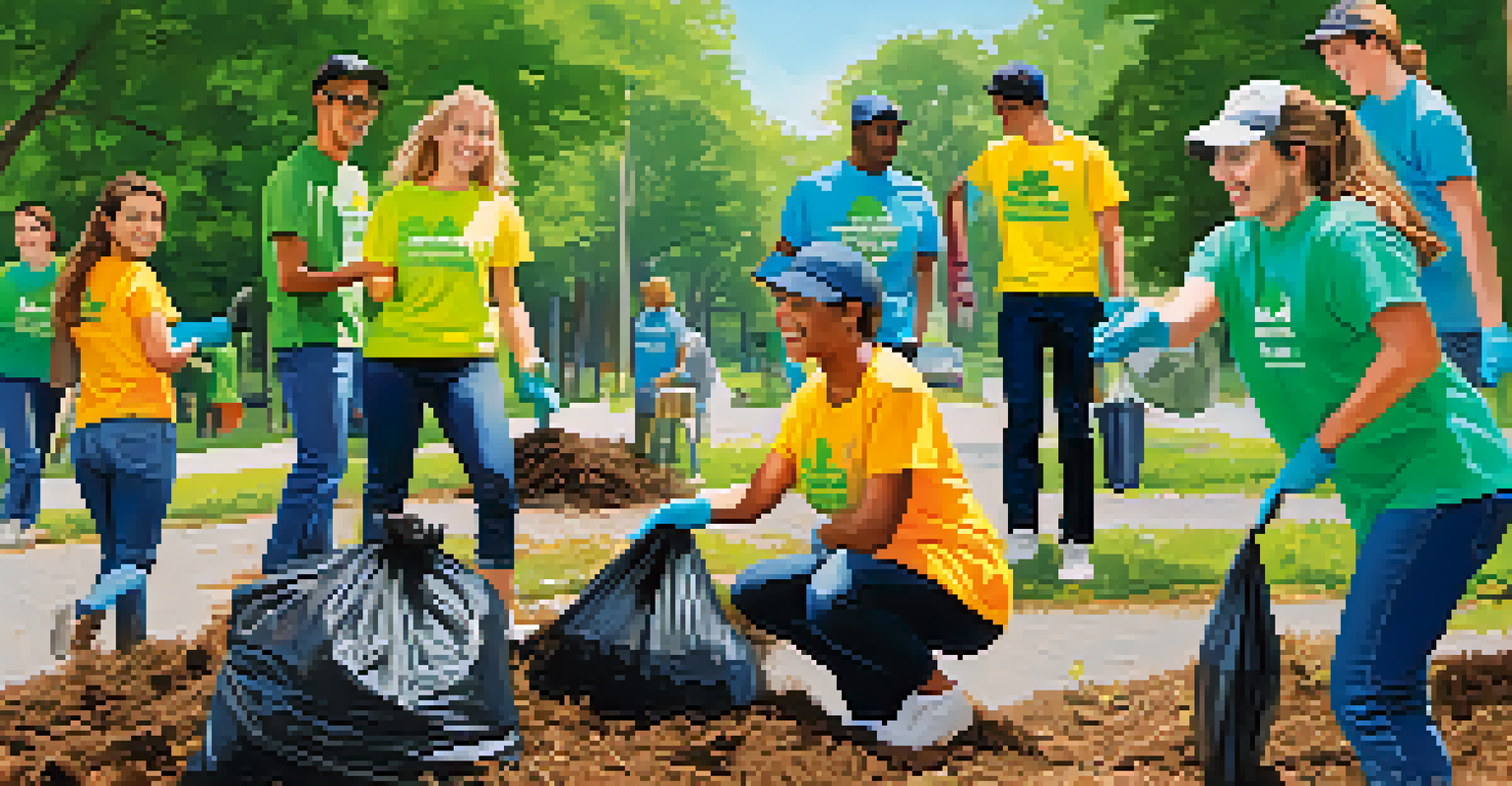Community Engagement in Atlanta: Building Stronger Resilience

Understanding Community Engagement in Atlanta's Context
Community engagement in Atlanta is all about creating connections among residents. It's a collaborative effort that empowers individuals to participate in local decision-making. By fostering these connections, Atlanta aims to build a stronger, more resilient community that can withstand challenges together.
The greatness of a community is most accurately measured by the compassionate actions of its members.
In a city as diverse as Atlanta, engaging with various communities is essential. Each neighborhood has its unique needs and strengths, so understanding these differences is key to effective engagement. This localized approach ensures that initiatives are not only relevant but also impactful, addressing the specific concerns of each community.
Moreover, community engagement isn't just about gathering feedback; it's about building trust. When residents feel heard and valued, they are more likely to participate actively in initiatives that affect their lives. This trust creates a foundation for resilience, enabling communities to rally together in times of crisis.
The Role of Local Organizations in Fostering Engagement
Local organizations play a crucial role in fostering community engagement in Atlanta. These groups often serve as bridges between residents and city officials, facilitating communication and collaboration. By leveraging their networks, they can amplify voices that might otherwise go unheard.

For example, organizations like the Atlanta Neighborhood Development Partnership work tirelessly to involve residents in urban development discussions. Their initiatives help ensure that community needs are prioritized in planning processes, which in turn fosters a sense of ownership and responsibility among residents.
Community Connections Build Resilience
Fostering connections among residents empowers individuals to participate in local decision-making, strengthening the community.
Additionally, these organizations often provide resources and training to empower community members. By equipping individuals with the skills they need to advocate for their interests, they contribute to a more resilient community that can effectively navigate challenges together.
Engaging Youth for a Resilient Future
Engaging youth in community initiatives is vital for building resilience in Atlanta. Young people bring fresh perspectives and innovative ideas, helping to shape the future of their neighborhoods. By involving them in decision-making processes, we not only empower the next generation but also cultivate a sense of responsibility.
Volunteers do not necessarily have the time; they just have the heart.
Programs like the Atlanta Youth Leadership Program aim to equip young leaders with the skills necessary for effective community engagement. These initiatives encourage youth to take an active role in addressing local issues, from environmental concerns to social justice. Their involvement enhances community resilience by ensuring that the needs of future generations are considered.
Moreover, when young people are engaged, they often inspire their peers and families to participate as well. This ripple effect can significantly amplify community engagement efforts, creating a culture where everyone feels invested in creating positive change.
Cultural Events as Catalysts for Community Connection
Cultural events in Atlanta serve as vibrant platforms for community connection and engagement. Festivals, parades, and art exhibitions bring people together, fostering a sense of belonging among diverse groups. These gatherings not only celebrate local culture but also provide opportunities for residents to meet and interact.
For instance, the Atlanta Arts Festival showcases local artists and encourages community participation through workshops and performances. Such events create shared experiences that strengthen community ties and promote resilience through collective celebration.
Local Organizations Amplify Voices
Local organizations serve as bridges between residents and officials, facilitating communication and ensuring community needs are prioritized.
Additionally, cultural events can spark important conversations about local issues. By bringing people together in a relaxed environment, community members can discuss challenges and solutions, paving the way for collaborative efforts that enhance resilience.
The Impact of Technology on Community Engagement
In today’s digital age, technology plays a significant role in enhancing community engagement in Atlanta. Social media platforms and community apps allow residents to connect, share information, and organize events more efficiently. This digital connectivity helps bridge gaps between different community segments.
For example, initiatives like Nextdoor encourage neighbors to engage with one another online, fostering a sense of community even in urban settings. These platforms enable residents to discuss local issues, share resources, and even organize support groups, thereby enhancing community resilience.
However, it's important to ensure that technology is accessible to all. Addressing the digital divide is crucial to ensuring that everyone can participate in community engagement efforts, reinforcing the notion that resilience is built when all voices are heard and included.
Volunteering: A Cornerstone of Community Resilience
Volunteering is a cornerstone of community resilience in Atlanta. When residents come together to support one another through volunteer efforts, they strengthen their connections and foster a sense of collective responsibility. This spirit of giving creates a robust safety net that can be vital during challenging times.
Organizations like Hands On Atlanta mobilize volunteers for various projects, from environmental clean-ups to tutoring programs. By getting involved, residents not only contribute to their community but also build relationships that enhance social cohesion.
Youth Engagement Shapes the Future
Involving youth in community initiatives empowers them to address local issues and inspires broader participation among their peers.
Moreover, volunteering provides a sense of purpose and fulfillment, reinforcing individual and community well-being. As more people engage in volunteer activities, they contribute to a culture of resilience that empowers neighborhoods to face adversity together.
Measuring the Success of Community Engagement Efforts
Measuring the success of community engagement initiatives is essential for understanding their impact. Atlanta employs various metrics to assess participation rates, community satisfaction, and the effectiveness of programs. This data-driven approach helps identify what works and what needs improvement.
For instance, community surveys can provide valuable insights into residents' perceptions of engagement efforts. By analyzing feedback, city officials can make informed decisions to enhance programs and better serve the community's needs.

Additionally, sharing success stories and challenges openly fosters transparency and trust among residents. When communities see tangible results from their engagement efforts, it reinforces the importance of participation and encourages ongoing involvement.